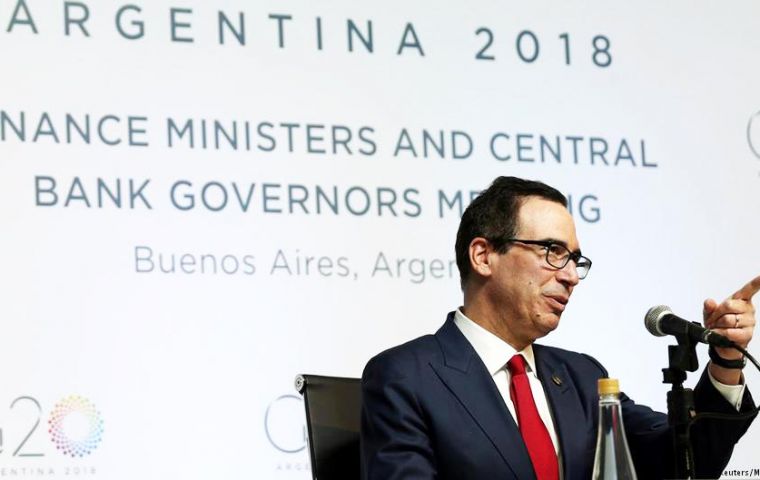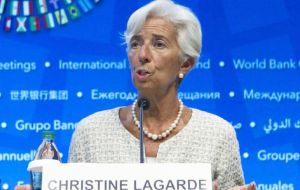MercoPress. South Atlantic News Agency
Global trade conflicts and protectionism in G20'agenda meeting in Buenos Aires
 Treasury Secretary Steven Mnuchin is set to “respond to concerns on US trade policies” in the G20's finance ministers and central bankers meeting
Treasury Secretary Steven Mnuchin is set to “respond to concerns on US trade policies” in the G20's finance ministers and central bankers meeting  IMF chief Christine Lagarde has warned that increasing trade restrictions pose “the greatest near-term threat” to the world economy
IMF chief Christine Lagarde has warned that increasing trade restrictions pose “the greatest near-term threat” to the world economy  Ms Lagarde also warned Trump on Wednesday that “the US economy is especially vulnerable” due to “retaliatory measures.”
Ms Lagarde also warned Trump on Wednesday that “the US economy is especially vulnerable” due to “retaliatory measures.” Global trade conflicts triggered by the protectionist policies of US President Donald Trump are set to dominate this weekend's meeting of Group of 20 finance ministers in Buenos Aires.
US Treasury Secretary Steven Mnuchin is set to “respond to concerns on US trade policies” in the meeting that groups finance ministers and central bankers from the world's 20 leading economies, including the European Union.
But International Monetary Fund chief Christine Lagarde has warned that increasing trade restrictions pose “the greatest near-term threat” to the world economy, despite projected growth of 3.9% through 2019.
She also warned Trump on Wednesday that “the US economy is especially vulnerable” due to “retaliatory measures.”
IMF economists say that in a worst case scenario US$430 billion, a half point, could be cut off global GDP in 2020 if all tariff threats and retaliation are implemented.
On the sidelines of the wider meetings, Group of Seven officials will also hold a one-hour session to again discuss what the United States dubs “China's economic aggression.”
The future of the North American Free Trade Agreement, Nafta, is also expected to come up in the main meeting, with high-stakes negotiations underway between the United States, Mexico and Canada to revamp the pact.
But unlike June's G7 summit in Quebec, where Trump pulled his support for the joint communiqué, the Buenos Aires meeting is expected to produce a common statement agreed by all, although perhaps one watered down on the question of protectionism, at the US's behest.
During the group's first meeting of the year in Buenos Aires in March, the ministers were at pains to agree on a statement that proffered the bland acknowledgement that “economic and geopolitical tensions” threatened global growth. And that was before Trump launched a raft of measures targeting US imports.
He imposed steep tariffs on steel and aluminum, angering allies such as the EU, Canada and Mexico, and prompting swift retaliation.
He also hit China with 25% duties on US$ 34 billion in goods, with another US$ 16 billion on the way, and another US$200 billion could be targeted as soon as September.
Last weekend he upped the ante by describing the EU as a “foe” and reiterating a previous claim that the bloc has “really taken advantage of us on trade.”
But the gathering won't exclusively focus on the United States, and its current strained relations with much of the rest of the G20.




Top Comments
Disclaimer & comment rulesCommenting for this story is now closed.
If you have a Facebook account, become a fan and comment on our Facebook Page!